Chick Bowdrie is a character depicted in numerous Western short stories authored by writer Louis L'Amour.
Chick Bowdrie is a character depicted in numerous Western short stories authored by writer Louis L'Amour.
Bowdrie is portrayed as a hardened Texas Ranger, with a reputation as being good with a gun, and who is feared and respected by outlaws and lawmen alike. He is described by L'Amour as a man who could have easily ridden as an outlaw or gunfighter, but was instead recruited by the Rangers, who preferred having him on their side rather than against them. He is smart, and an expert at tracking, and speaks German, French, Comanche, some Spanish and English. The two novels in which L'Amour uses Bowdrie as his central character include: Bowdrie, with 8 short stories: Bowdrie Rides A Coyote Trail,A Job For A Ranger,Bowdrie Follows A Cold Trail,Bowdrie Passes Through,A Trail To The West,More Brains Than Bullets,Too Tough To Brand,The Killer From The Pecos; the second novel Bowdrie's Law, includes 10 short stories: McNelly Knows A Ranger,Where Buzzards Fly,Case Closed-No Prisoners,Down Sonora Way,The Road To Casa Piedras,A Ranger Rides To Town,South Of Deadwood,The Outlaws Of Poplar Creek,Rain On The Mountain Fork, and Strange Pursuit.
Charles Bowdrie was born around the area of D'hanis, Texas sometime between the years of 1861 and 1863. His facial features often lead people to assume that he is of Native American heritage. This is not true however, Bowdrie was raised by a Comanche tribe from the time his parents were killed by Native Americans. It was with the Comanches that Bowdrie learned how to hunt, track and how to survive. At age twelve the Comanches sent him back to live with the neighboring white population. From there Bowdrie went out on his own and began work on various cattle ranches and cowboys outfits. It was also during this time of teenage years that he is said to have come very close to riding on the wrong side of the law.
At age twenty-one Bowdrie became mixed up with the wrong crowd and ended up getting involved in a gunfight. Bowdrie was shot three times in the fight but was able to ride off. He was able to survive long enough to arrive at the cattle ranch of Noah Wipple. Noah and his family took him in, nursed him back to health and gave him a job. Only a few months later, Noah Wipple was murdered in the local town of Miller's Crossing. Bowdrie then went into town to pursue the man who had killed his friend and employer. When he arrived in town he saw a Help Wanted poster that was advertising a job for the Texas Rangers. Bowdrie thought he would be better equipped to catch Wipple's killer if he was on the right side of the law. He joined the Texas Rangers and was sworn in by Capt. Leander McNelly himself. [1] From there Bowdrie remained riding for the law. From the eighteen short stories by Louis L'Amour, we know that during his career as a Ranger, Bowdrie has been responsible for multiple outlaws killed or captured. He has survived ten gunshot wounds and has been documented to have survived at least thirty-three gunfights. Bowdrie was twenty-five years old during the story Strange Pursuit, the last story written, so Browdrie's career and adventures as a ranger took place over the course of approximately four years. The sixth story written, Bowdrie Follows a Cold Trail takes place in the year 1885. [2] [3]
Louis L'Amour's Chick Bowdrie character was written for the pulp magazines of the 40s and 50s. The first Chick Bowdrie adventure A Job for a Ranger appeared in the December 1946 issue of Popular Western. The last Chick Bowdrie story Strange Pursuit was published in the April 1952 issue of Texas Rangers. [4]

Louis Dearborn L'Amour was an American novelist and short story writer. His books consisted primarily of Western novels, though he called his work "frontier stories". His most widely known Western fiction works include Last of the Breed, Hondo, Shalako, and the Sackett series. L'Amour also wrote historical fiction, science fiction, non-fiction (Frontier), and poetry and short-story collections. Many of his stories were made into films. His books remain popular and most have gone through multiple printings. At the time of his death, almost all of his 105 existing works were still in print, and he was "one of the world's most popular writers".

Comanche Moon (1997) is a Western novel by American writer Larry McMurtry. It is the fourth and final book he published in the Lonesome Dove series. In terms of chronology, it is the second installment of the narrative. A Comanche Moon in Texas history was a full moon in autumn which permitted Comanche warriors to ride by night journeying southward to raid Mexico for livestock and captives.
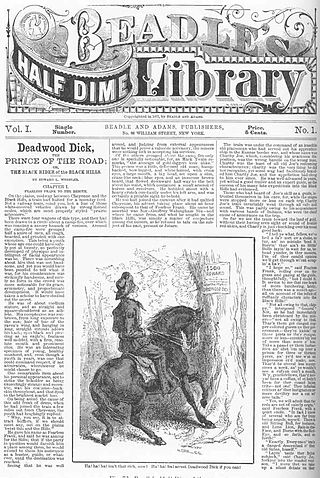
Deadwood Dick is a fictional character who appears in a series of stories, or dime novels, published between 1877 and 1897 by Edward Lytton Wheeler (1854/5–1885). The name became so widely known in its time that it was used to advantage by several men who actually resided in Deadwood, South Dakota.

Tom Tyler was an American actor known for his leading roles in low-budget Western films in the silent and sound eras, and for his portrayal of superhero Captain Marvel in the 1941 serial film The Adventures of Captain Marvel. Tyler also played Kharis in 1940's The Mummy's Hand, a popular Universal Studios monster film.

Leander Harvey McNelly was a Confederate officer and Texas Ranger captain. McNelly is best remembered for leading the "Special Force", a quasi-military branch of the Texas Rangers that operated in south Texas in 1875–76.

Francis Augustus Hamer was an American lawman and Texas Ranger who led the 1934 posse that tracked down and killed criminals Bonnie Parker and Clyde Barrow. Renowned for his toughness, marksmanship, and investigative skill, he acquired status in the Southwest as the archetypal Texas Ranger. He was inducted into the Texas Ranger Hall of Fame. His professional record and reputation are controversial, particularly with regard to his willingness to use extrajudicial killing even in an increasingly modernized society.

The Walking Drum is a novel by the American author Louis L'Amour. Unlike most of his other novels, The Walking Drum is not set in the frontier era of the American West, but rather is an historical novel set in the Middle Ages—12th-century Europe and the Middle East.
Ralph Compton was an American writer of western fiction.
Robert North Bradbury was an American film actor, director, and screenwriter. He directed 125 movies between 1918 and 1941, and is best known for directing early "Poverty Row"-produced Westerns starring John Wayne in the 1930s, and being the father of noted "cowboy actor" and film noir tough guy Bob Steele.
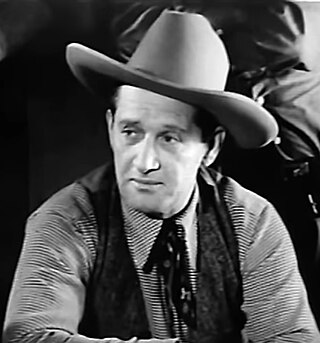
John Samuel Ingram was an American film and television actor. He appeared in many serials and Westerns between 1935 and 1966.

Jefferson Davis Milton was an Old West lawman and a son of Confederate Governor of Florida John Milton. He was the first officer appointed to the U.S. Immigration Service Border Patrol in 1924.

Edmund Fessenden Cobb was an American actor who appeared in more than 620 films between 1912 and 1966.
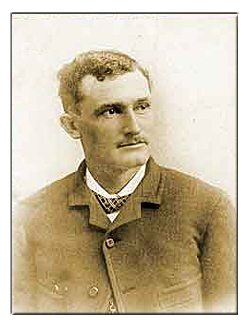
John Reynolds Hughes was a Texas Ranger and cowboy of the Old West, and later an author. Several books were written about him, known as one of the most influential Texas Rangers of all time.
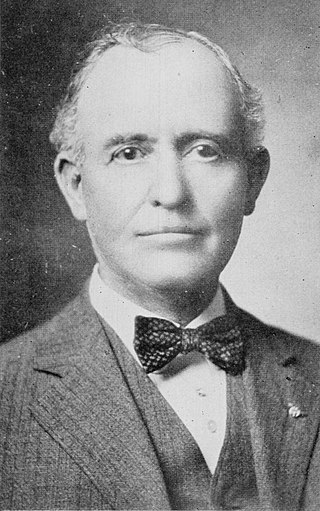
James Buchanan Gillett was a lawman of the Old West, mostly known for his service as a Texas Ranger. He is a member of the Texas Rangers Hall of Fame.
Lon Oden was a Texas Ranger of the Old West, and is a legend inside the Texas Rangers organization.
William Everett Cook, was a western writer who used the pen names Will Cook,James Keene,Wade Everett and Frank Peace. Called "a master western storyteller," Cook published dozens of short stories and 50 novels before his death at age 42. A number of his stories and novels were turned into Hollywood westerns, including the 1961 John Ford film Two Rode Together.

The Lawless Breed is a 1953 American biographical crime Western film produced and distributed by Universal-International, directed by Raoul Walsh, starring Rock Hudson and Julie Adams. The film is a romanticized story based on the life of outlaw John Wesley Hardin.
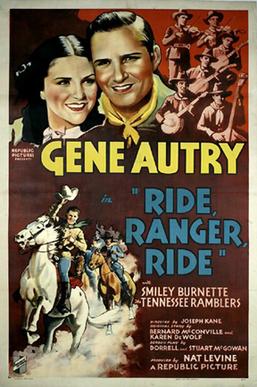
Ride Ranger Ride is a 1936 American Western film directed by Joseph Kane and starring Gene Autry, Smiley Burnette, and Kay Hughes. Based on a story by Bernard McConville and Karen DeWolf, and a screenplay by Dorrell and Stuart E. McGowan, the film is about a Texas Ranger working undercover to protect an Army wagon train full of ammunition and supplies. The Army doesn't believe him at first, until the Comanche arrive.
The Smith Gang was a band of American cattle rustlers who operated in the Southwest during the late 1890s to 1901. The gang was founded by Bill Smith and included six others, mainly Bill's family members. After an encounter with the law in Arizona Territory, known as the Battleground Gunfight, the Smith Gang was forced to escape to Mexico in October 1901.
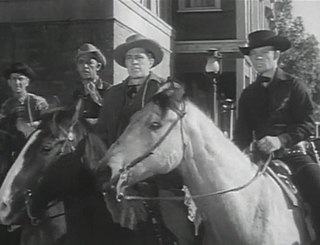
Luther Palmer was an American film and television actor. He appeared in over 300 films and television programs between 1929 and 1962.